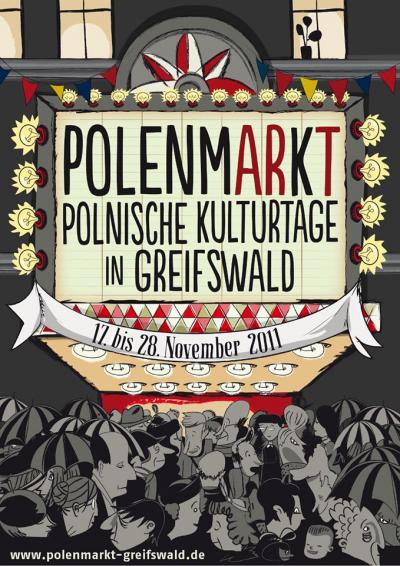The “polenmARkT” Festival in Greifswald

This all began in the second half of the 1990s, when PhD students and students of Slavic Studies got together over a beer after their lectures at the student club “Tschaika”, not far from the main building of the Ernst Moritz Arndt University. Among those present at these get-togethers was Karin Ritthaler, a lecturer in Polish studies who had been working at the university for a year, and who was amazed that in this town that was so close to the Polish border, there was so little contact to the neighbouring country. To remedy this, in 1997 she decided to hold a Polish evening in “Tschaika” with her students. The evening was so successful with such keen interest that Ritthaler spoke to the rector of Greifswald University to suggest the idea of establishing a whole week of events in the town to promote Polish culture. This proposal was approved and in November 1998 the first Polish cultural week was held. A year later, the name “polenmARkT” was established. It was a reference to the cheap bazaars which were popular at the time and which in Germany were generally associated with Poles. The festival organisers used this cliché so that they could challenge it and give it new meaning by inviting the town’s inhabitants to visit a Polish art market.
From the start, the festival was organised by just a few volunteers. But the increasingly impressive programme of the ten-day event with its varied offering soon meant that, despite the great commitment shown by those running the event, a legal framework had to be created to facilitate the financing of the programme. This institutionalisation started when the polenmARkt became an association - “polenmARkT e.V.”. Despite this, every year finding the means to put on the festival is still a demanding responsibility for the event organisers. There is still no long-term financing, and funding applications made to various institutions are not always successful, despite the festival being of some renown. Some foundations pull out of sponsoring once they have been won over because their articles of association state that they should preferably not support recurring events.
Despite all these difficulties, however, the festival continues to run and is now an established name in the Western Pomeranian cultural events calendar. The “polenmARkT“ is definitely not a small event. The encounters with Polish literature, exhibitions, concerts, film screenings and theatre performances take place at the most important cultural centres in Greifswald, such as the Koeppenhaus literature centre, the Pomeranian State Museum, the St. Spiritus centre, the Theatre of West Pomerania, the Hans Fallada house and the Alfried Krupp College, a state-of-the-art centre for science. Smaller events are held in cafés, an antiques shop and in the libraries. The festival now extends well beyond the Greifswald boundaries and has created offshoots in Anklam, Stralsund, in the imperial Baltic Sea resorts and in the cities of Ueckermünde and Löcknitz near the border. The “polenmARkT” is visited by around four thousand visitors every year, making it one of the most important cultural events in the northeast of Germany.
And although the festival emerged from academia, it has not been a student-led event for a long time now. The program is aimed at a broad public and takes into account the diverse interests of all those involved. In the past few years, numerous famous authors have appeared, who are well known both in Poland and abroad, such as Olga Tokarczuk, Andrzej Stasiuk, Stefan Chwin, Joanna Bator, Wojciech Kuczok, Szczepan Twardoch and many more. There is also a broad musical offering. Concerts by the outstanding jazz musician Leszek Możdżer, the composer and instrumentalist Mikołaj Trzaska and the bands Voo Voo, Dezerter, Brygada Kryzys and the Klezmer band Kroke serve the discerning taste of music lovers. For several years now, the festival has also offered a programme for children, including book samples for the very little ones. There is also “serious” culture,e with talks on history and linguistics, Polish language courses and even cookery courses that serve to keep the shared European heritage in Poland and Germany alive at the hob. Fundamentally, the festival is there to showcase both timeless and current topics. That is why there were films and discussions about the situation in the Ukraine, about the fate of Germans in Poland after the war, about the Katyn massacre, about Polish forced labourers and about the role of women in times of “Solidarność”. The intense discussions resulting from these talks often go on long into the night.
n 2011, the jury of the “Pomerania Nostra” prize honoured the work of the “polenmARkT” association and the regular festival it conceived. This award is given to people who performed special services in the arts, science, politics, the economy, and social interaction. The prize was donated by the towns of Greifswald and Szczecin, the Greifswald and Szczecin universities and the editorial offices of the “Kurier Szczeciński” daily newspaper and the West Pomeranian “Nordkurier”. The prize giving ceremony for the representatives of the “polenmARkT” association was held in the castle of the Pomeranian Dukes (Zamek Książąt Pomorskich) in Szczecin, after it had already been awarded the prize for services to German-Polish cooperation by the Sparkasse Vorpommern. In 2017, on the occasion of the festival's 20th anniversary, the “polenmARkT e.V.” was awarded the German culture award of the state of Mecklenburg-Western Pomerania. Here too, the long-standing contribution that the “polenmARkT” festival had made to consolidating German-Polish relations was instrumental in gaining the jury’s vote. The festival, which is not held in large cities where making contact with a neighbour’s culture is usually easier, has become a place in which the idea of German-Polish rapprochement can be experienced more easily than in any governmental talks.
Monika Stefanek, April 2020
polenmARkT e.V.
c/o Institut für Slawistik
Universität Greifswald
Ernst-Lohmeyer-Platz 3
17489 Greifswald
info@polenmarkt-festival.de
https://www.polenmarkt-festival.de/
https://www.facebook.com/polenmark


















